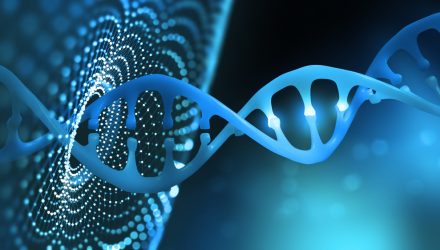ETF Trends CEO Tom Lydon discussed the ARK Genomic Revolution Multi-Sector Fund (ARKG) on this week’s “ETF of the Week” podcast with Chuck Jaffe on the MoneyLife Show.
The ARK Genomic Revolution ETF (ARKG) is an actively-managed fund from the team at ARK Invest that tries to pick the companies best positioned to profit from advancements in energy, automation, manufacturing, materials, and transportation.
ARKG is an outperforming biotech ETF. It’s had an 11.2% 1-week return and is one of the best performing non-leveraged ETFs of the second quarter +67.7% Q2. ARKG is up 41% year-to-date. In comparison, the Nasdaq Biotechnology Index is up 14.6% year-to-date. The S&P 500 is -3.5% year-to-date.
As it stands, there’s short-term support from the hope of a viable coronavirus, COVID-19 drug—for example, Inovio Pharmaceuticals. The Department of Defense provided funding to Inovio Pharmaceuticals (NasdaqGS: INO) to scale up the manufacturing of a DNA vaccine for the novel coronavirus. Inovio was among the first groups to tackle the COVID-19 problem back in January.
The company has advanced to human testing and scored a $71 million contract from the U.S. government for a delivery device of the potential vaccine. According to Inovio Pharma, the new device runs on A.A. batteries and can “function reliably in challenging environments,” which can be beneficial during pandemics when vaccine demand is extremely high and can be utilized more efficiently in some areas of the world suffering from inadequate health systems and supply chains.
This is not just a short-term Coronavirus story. It capitalizes on greater merger and acquisition activity as more large companies try to expand into specialized offerings.
ARKG capitalizes on innovative, specialized drugs that are being developed by many overlooked names. Invitae Corp. (NYSE: NVTA) announced a $1.4 billion deal for ArcherDX, potentially bolstering the genetic information company’s offering lineup and growth outlook. The agreement to acquire genomics analysis company ArcherDX is expected to create a hub for precision oncology, diagnostics, therapy optimization, and monitoring.
Looking at the Long-Term Outlook
ARKG includes companies that merge healthcare with technology and capitalize on the revolution in genomic sequencing. These companies try to understand better how biological information is collected, processed, and applied by reducing guesswork and enhancing precision; restructuring health care, agriculture, pharmaceuticals, and enhancing our quality of life.
The convergence of Artificial Intelligence (A.I.), Next Generation DNA Sequencing (NGS) and CRISPR gene-editing has the potential to boost the efficiency of drug development radically. Breakthroughs in genomic science can present new treatments to help patients recover from what were once believed to be incurable afflictions.
The global genomics market was worth $851.96 million in 2019. It is expected to grow at a compound annual growth rate (CAGR) of 14.71% and reach $1.5 billion by 2023.
Rising government funds for research on genomics drives the growth of the single-cell genomics market. The government funding focuses on efforts to resolve the complexity of the human genome, the genomic basis of human health and disease, and ensure that genomics is used safely to enhance patient care and benefit society through government, public and private institutions.
Related: ETF of the Week: Roundhill Sports Betting & iGaming ETF (BETZ)
Scientists have identified more than 50,000 genetic diseases caused by single-gene mutations, many of which are likely to be treated through genomic approaches, including several methods that have already begun to receive FDA approval.
Looking ahead, CRISPR-based innovations are expected to accelerate, given the technology’s ease of use, cost-efficacy, a growing body of research surrounding its safety and AI-powered CRISPR nuclease selection tools. CRISPR could also be utilized to address some of the most prominent healthcare problems, which opens up a significant investment opportunity in monogenic diseases.
Bolstering the case for ARKG over the long-term is the importance of genomics in an array of clinical trials. Drug development companies are making clinical trials more efficient by using NGS to find and enroll patients likely to respond. Half of the clinical trials and 80% of oncology trials now collect genetic information. ARK believes that clinical trials using genetic diagnostics will result in fewer failed drugs and will increase capital efficiency.
Listen to the full podcast episode on ARKG ETF:
For more podcast episodes featuring Tom Lydon, visit our podcasts category.

